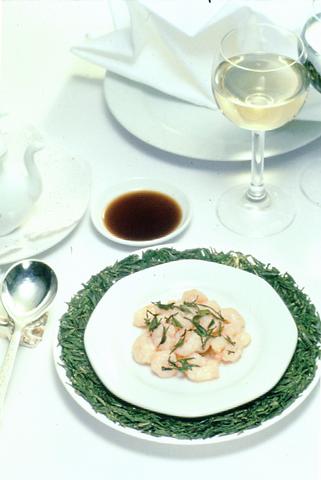For many in Taipei, Tien Hsiang Lo is a synonym for Hangchow cuisine, which, to many gourmands, is also a synonym for unique and exquisite delicacies. The original Tien Hsiang Lo restaurant in Hangchow dates back more than 100 years.
After the Chinese Civil War, in 1949, the main chefs of this famed restaurant fled to Hong Kong where they established the equally famous Hong Kong Tien Hsiang Lo. Thirteen years ago Stanley Yen (嚴長壽), president of Taipei's five-star Ritz Landis, dispatched chefs to Hong Kong with a mission to learn classic Hangchow cuisine from the chefs of the original Tien Hsiang Lo. Under a cooperative agreement, they returned to set up their own Tien Hsiang Lo in Taipei. The two restaurants are widely recognized as offering the best Hangchow cuisine in the world.

PHOTO: COURTESY OF RITZ LANDIS,TAIPEI
Hangchow cuisine can be summed up with the phrase "southern ingredients, northern style" (南菜北烹). This means that the varieties of fish, shrimp, and other crustaceans in Hangchow's much-celebrated historic West Lake are prepared in northern-style, sweet and sour-based flavors. Hangchow cuisine can be traced to 800 years ago, when the Sung dynasty moved its capital from the north to Hangchow, fleeing foreign invaders. The royal chefs, who had been accustomed to northern cuisine, had to make use of local materials. Hangchow style is, therefore, a kind of ancient imperial cuisine.
Sauted shrimp with long-ching tea leaves (龍井蝦仁) is a delightful representative Hangchow dish. Instead of using vegetables, the chefs saute the shrimp with freshly pickled long-ching tea leaves. The shrimp come out white and tender, while the tea leaves add an elegant presentation and delicate taste.
Madame Sung's fish soup (宋嫂魚湯) is a typical "southern ingredients, northern style" dish, according to Yang Kuang-tsung (楊光宗), sous chef of the hotel. This southern version of sour and spicy soup adds more vegetables and has abundant boneless fresh-water fish, mushrooms, egg yolk, bamboo shoots and a dash of Shaoshing wine.
One distinct plus about Tien Hsiang Lo is that dishes are presented in individual portions, which allows diners to sample a variety of flavors without having to order more food than one person can eat.
Autumn is also the best season to feast on giant fresh-water crabs, another Hangchow delicacy.

This is the year that the demographic crisis will begin to impact people’s lives. This will create pressures on treatment and hiring of foreigners. Regardless of whatever technological breakthroughs happen, the real value will come from digesting and productively applying existing technologies in new and creative ways. INTRODUCING BASIC SERVICES BREAKDOWNS At some point soon, we will begin to witness a breakdown in basic services. Initially, it will be limited and sporadic, but the frequency and newsworthiness of the incidents will only continue to accelerate dramatically in the coming years. Here in central Taiwan, many basic services are severely understaffed, and

Jan. 5 to Jan. 11 Of the more than 3,000km of sugar railway that once criss-crossed central and southern Taiwan, just 16.1km remain in operation today. By the time Dafydd Fell began photographing the network in earnest in 1994, it was already well past its heyday. The system had been significantly cut back, leaving behind abandoned stations, rusting rolling stock and crumbling facilities. This reduction continued during the five years of his documentation, adding urgency to his task. As passenger services had already ceased by then, Fell had to wait for the sugarcane harvest season each year, which typically ran from

It is a soulful folk song, filled with feeling and history: A love-stricken young man tells God about his hopes and dreams of happiness. Generations of Uighurs, the Turkic ethnic minority in China’s Xinjiang region, have played it at parties and weddings. But today, if they download it, play it or share it online, they risk ending up in prison. Besh pede, a popular Uighur folk ballad, is among dozens of Uighur-language songs that have been deemed “problematic” by Xinjiang authorities, according to a recording of a meeting held by police and other local officials in the historic city of Kashgar in

It’s a good thing that 2025 is over. Yes, I fully expect we will look back on the year with nostalgia, once we have experienced this year and 2027. Traditionally at New Years much discourse is devoted to discussing what happened the previous year. Let’s have a look at what didn’t happen. Many bad things did not happen. The People’s Republic of China (PRC) did not attack Taiwan. We didn’t have a massive, destructive earthquake or drought. We didn’t have a major human pandemic. No widespread unemployment or other destructive social events. Nothing serious was done about Taiwan’s swelling birth rate catastrophe.